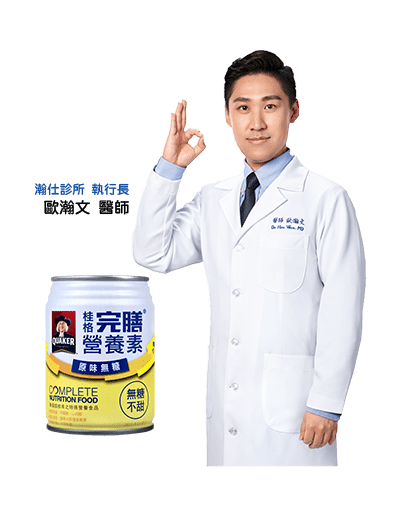Mr. Huang, who is in his 40s, is a health-conscious person who loves to exercise. He has always been proud of his well-maintained physical shape. This year, he made use of the triennial free health check-up provided by the Health Promotion Administration to Taiwanese citizens aged between 40 and 64. Much to his surprise, the result showed unexpected warnings!
It turned out that, although Mr. Huang doesn't dine-out every meal, he still has dietary preferences and deliberately restricts his food intake. The lack of variety and diversity in his food choice over time and the insufficient amount consumed caused his nutrient intake to be out of balance.
People Over Age 45 Should Pay Closer Attention to Eating a Balanced Diet
According to the "2013-2016 Survey on the Changes in Citizen Nutrition and Health in Taiwan" (Note 1) by the Health Promotion Administration, among people over the age of 45 years, there is a serious imbalance in the intake of vitamins and minerals, especially calcium, magnesium, zinc, vitamin D, vitamin E, and dietary fiber.
"Micronutrients, such as vitamins, minerals, and dietary fibers are important nutrients that keep the body functioning well. A prolonged period of insufficient intake can turn warning signs into problematic issues at an alarming speed!" Dr. Han-Wen Ou, the CEO of Dr. O Clinic holds a degree in Human Nutrition and Functional Medicine, reminds everyone.
He further stated that, in clinical medicine, calcium and vitamin D are associated with bones quality, while vitamin D is also related to nerve and muscle physiological functions. Zinc is a component of insulin and various enzymes; it is associated with body metabolism and can improve skin health. Vitamin E not only has antioxidant effects but is also related to the cardiovascular system. Dietary fiber is also related to blood sugar. These are all linked to the nutrients that Taiwanese people lack. If you are worried about your nutritional state, you can get a clearer understanding about it through medical testing for nutrients and antioxidant vitamins.
How to Keep a Balanced Diet? Six Main Pieces of Advice Given by Doctors
What can the general public eat to prevent nutritional imbalances or deficiencies? Dr. Han-Wen Ou provided recommendations for eating healthfully based on the 2015-2020 New Dietary Guidelines formulated by the USDA (Note 2):
- Eat fresh fruits: Do your best to consume "whole fresh fruits," which contain more complete nutritional value.
- Eat a variety of vegetables: Choose a wide variety of fresh, different colored vegetables.
- Replace white rice with whole grains: For every meal, whole grains should make up half of the total amount of consumption.
- Consume dairy every day: Choose low-fat and non-fat dairy products over other dairy products.
- Consume a variety of proteins: Don't just eat one type of protein. Beans, fish, eggs, and meat should all be daily sources of protein.
- Consume a variety of fats: Avoid excess consumption, pay attention to the composition of fatty acids, and reduce trans-fat intake.

However, if you feel that you or your family have difficulties following the recommended dietary guidelines for every meal, you may wish to incorporate nutritional supplements in your diet to maintain nutritional balance and good health. For the following five population groups, it is especially important to pay attention to nutritional imbalance:
- People with poor dental health and have difficulties chewing food may have problematic dietary structures.
- People with deteriorated digestive tract functions have difficulties in digesting and absorbing foods' nutritional values.
- People with poor appetite eat very little for their daily diet.
- People who constantly eat out and those who are picky eaters.
- People who cook simple meals as they live with a small family or live alone.
Complete Nutrition (original flavor and sugar-free) by Quaker - a major international brand trusted by consumers - is produced according to the Ministry of Health and Welfare's recommended dietary intake (DRIs). It is an example of nutritional supplements that are suited for people who have difficulties obtaining sufficient nutrients from their daily diets. Drinking Quaker's Complete Nutrition every day allows the consumer to increase the intake of more than 30 types of essential nutrients without consuming sugars and causing extra burden on their metabolism, helping consumers to easily maintain nutritional balance. It also contains high-quality protein, which can help with tissue repair and muscle growth, enabling you to be full of energy every day so you can take good care of both work and family.
Information Sources: Note 1: "2013-2016 Survey on the Changes in Citizen Nutrition and Health in Taiwan" by the Health Promotion Administration
Note 2: 2015-2020 New Dietary Guidelines by the USDA

